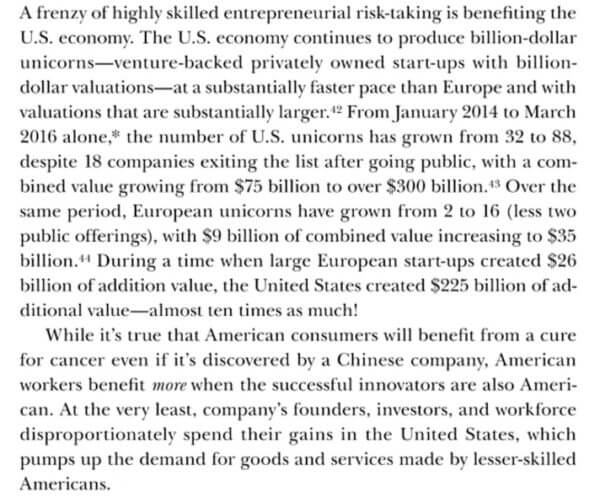Ricochet is the best place on the internet to discuss the issues of the day, either through commenting on posts or writing your own for our active and dynamic community in a fully moderated environment. In addition, the Ricochet Audio Network offers over 50 original podcasts with new episodes released every day.
 Competitive Capitalism vs. Cuddly Capitalism: Which Is Better?
Competitive Capitalism vs. Cuddly Capitalism: Which Is Better?
 Europe is a rich, well-educated, orderly place. And many Americans not only like to visit and do business there, but also see it as an aspirational economic model.
Europe is a rich, well-educated, orderly place. And many Americans not only like to visit and do business there, but also see it as an aspirational economic model.
Well, not Greece and Italy so much, but certainly the Nordic nations. Many progressive Democrats really have a thing for Scandinavia and its egalitarian social democracies. “I think we should look to countries like Denmark, like Sweden, and Norway, and learn from what they have accomplished for their working people,” Bernie Sanders said during one of his debates with Hillary Clinton. And there are certainly Europeans who agree. For instance, I recently had a long chat with by Anu Partanen, a New York-based Finnish and American journalist, about her book “The Nordic Theory of Everything.”
In another Q&A, however, my AEI colleague Stan Veuger was skeptical that going Nordic was as easy or efficacious as progressives and Partanen believe. Along the same lines, a 2012 analysis by Daron Acemoglu, James Robinson, and Thierry Verdier argues that even though many countries “may want to be like the Nordics with a more extensive safety net and a more egalitarian structures,” it’s not really possible to have “cuddly” capitalism with America’s more high-pressure, competitive, or “cutthroat” capitalism. From their research:
As a matter of fact, given the institutional choices of other countries, if the cut-throat leader were to switch to such cuddly capitalism, this would reduce the growth rate of the entire world economy, discouraging the adoption of the more egalitarian reward structure. In contrast, followers are still happy to choose an institutional system associated to a more egalitarian reward structure. Indeed, this choice, though making them poorer, does not permanently reduce their growth rates, thanks to the positive technological externalities created by the cut-throat technology leader. This line of reasoning suggests therefore that in an interconnected world, it may be precisely the more cut-throat American society, with its extant inequalities, that makes possible the existence of more cuddly Nordic societies.
And if you want to know what the phrase “positive externalities” means in this case, take a look at these two charts from the Wall Street Journal looking at venture-backed private companies valued at $1 billion or more in Europe and America.
First, Europe:

And now the US:

And while the US gains in terms of direct jobs and taxes by companies and employees, most of the benefits that flow from these companies are widely shared. Most of the value of, say, the iPhone, isn’t captured by Apple.
Still, we like that the US economy is able to generate this high-impact, fast-growing, innovative new firms. As AEI’s Edward Conard writes in his new book, “The Upside of Inequality“:

Not much talk about this sort of thing this election season, or about what sort of public policy can create an even better ecology for this important competitive advantage. And why does the US do so much better than Europe in this area? In addition to research cited above, here are a few explanatory blog posts:
Why can’t Europe create its own Facebook, Apple, Netflix, or Google? Here’s what Europeans think
Why does the US generate more fast-growing tech startups than Europe?
Why Europe failed to match America’s tech boom
Finally, speaking of cuddy capitalism, here is a bit from an excellent piece by John Gapper of the Financial Times that touches on the issue:
Published in EconomicsThis week is Oslo Innovation Week, a gathering of technology start-ups, venture capitalists and Norwegian companies such as Statoil, the state-owned oil and gas company. The theme isomstilling, the name for Norway’s nascent shift to living without the energy industry that has brought it wealth and welfare for 45 years.
Why hurry, some wonder. Its 5.2m citizens are among the world’s comfiest, with gross domestic product per head of $75,000. Its oil-funded sovereign wealth fund, set up in 1990 to help it avoid “Dutch disease” — the syndrome of resource wealth driving up national currencies and weakening other sectors — is worth $880bn. Its oil and gas reserves should last for another half-century.
The trouble is that Norway is too comfortable. It takes a crisis to get most people to change their ways radically or for an economy to adjust the way that it works. Whatever you think of Brexit, it is one of those crises. At the moment, Norway has more official think-tanks and innovation incubators than entrepreneurship and disruption.
The oil fund is exemplary in many ways: by taking the wealth largely out of the hands of the government and directing it into overseas investment, Norway has avoided the worst of Dutch disease. But it adds to the sense of the country having a cushion against change: the fund’s very existence extends its deadline to reshape the economy.
The citizens are also cushioned. The government devotes the equivalent of 20 per centof “mainland” GDP — the output of the non-energy economy — to social benefits, and Norwegians work 80 per cent of average hours in OECD countries, the equivalent of one less day a week. The energy sector is highly paid and productive but productivity growth elsewhere has lagged behind.
Norway has the potential to adapt. It has less of a human resources challenge than the UK: its people are well educated and offshore exploration requires engineers with skills that are useful in technology and software. The most coveted attainment for an 18-year-old is not to become a banker but to study engineering at the Norwegian University of Science and Technology.
But this potential has to be exploited and Norway remains hesitant about change. There were plenty of young people touting start-ups at Innovation Week but many work part-time for big companies and experiment with entrepreneurship in their spare hours. They do not need to take the plunge.




Measure educational, income, work ethic of American’s of Nordic background and they beat the European Nordics. On the other hand we give more stuff away than any of them we just do it with greater corruption because it’s all political while the Scandinavians actually believed in that stuff, not so much any more. Folks who believe diversity and size is neutral relative to central controls and resource allocation, i.e. public goods relative to private goods, don’t have lots of kids or never pay attention to what they fight over.
Working for a European financial institution, I see a lot of young analysts from Europe come and go. Many of them stay in the U.S. (or would like to have stayed here), because they see it as a place with better career opportunities for them.
Very interesting that Ms. Partanen believes the U.S. would be better off by adopting many of the aspects of the Nordic economic system…yet she lives in the U.S. and is a citizen of it. One would think that if it is so great…she would stay in Finland.
The cutthroat capitalism mirrors nuclear defense. Once the US made the breakthrough on nuclear technology, for all intents and purposes, every country aligned with the US also reaped its benefits (even if they never contributed a dime or idea).
Innovation is basically a public good; once it’s achieved, it’s almost impossible to contain its effects for everyone.
I strongly dislike the broad generalizations used in arguments like this. Take, for example, Heritage’s data comparing economic freedom on the US and Sweden. Ah. you say – see even now the US’s overall score remains higher than Sweden. Then look at the components making up the figure and you see that in terms of business freedom and a competitive market Sweden is scored higher than the US (sometimes significantly so). The Swedish approach is to liberate capitalism red in tooth and claw and let rip (the reaction of a minister to the GM bankruptcy, which meant that Saab would close was famously “so what”). They regulate hiring heavily (as opposed to the US which regulates everything else), tax heavily, and distribute the revenue in social programmes.
You can argue (and I would) about the viability of those programmes – and Sweden has been revising those – but the story is far, far more complex and nuanced than “Sweden Socialist, US not”.
I spend a lot of time in Denmark. Yes, they have their healthcare and college paid for by taxes.
Think that is great? Consider this. Their tax on cars is 180%. This means you buy one and almost pay for three. At least the price of gas is down. It is only about $6 a gallon there now. In the nastiest of weather, they ride their bikes to work because they can’t afford to drive. Their homes are so expensive that even high-end professionals never hope to own their homes, and they are much smaller than ours as well. At one of my company’s worldwide conferences, one of our Danish engineers won a laptop computer. She had to turn it down, because she couldn’t afford the taxes she would have to pay on it when she returned home. A friend of mine had some of the upper management from Denmark to his house one evening (They wanted to shoot guns, something else they can’t do in Denmark). They were shocked that he could own a house, 2 cars, a motorcycle, an old tractor, and a john boat. These are things common to most good-ole-boys in our area, yet executives in Denmark can’t even imagine having them.
Socialism has a cost. Unfortunately, few want to consider it.
I read somewhere that Americans of Scandinavian descent enjoy higher incomes and are “happier” than their counterparts in Europe. (Ms Partanen hinted as much, yet she still wanted us to adopt their social programs.) So there is obviously a lot more going on here than simply economic and social systems. This should warn us that transplanting Scandinavian statism to the USA would probably fail (for one thing, their civil servants are better educated, have a superior work ethic, and are less corrupt than ours) .
Also, it would make more sense to compare Finland to a U.S. state of similar size and demographics (Vermont and Minnesota come to mind) before advocating a nationwide shift to Swedenize our much more vast and incredibly diverse country.